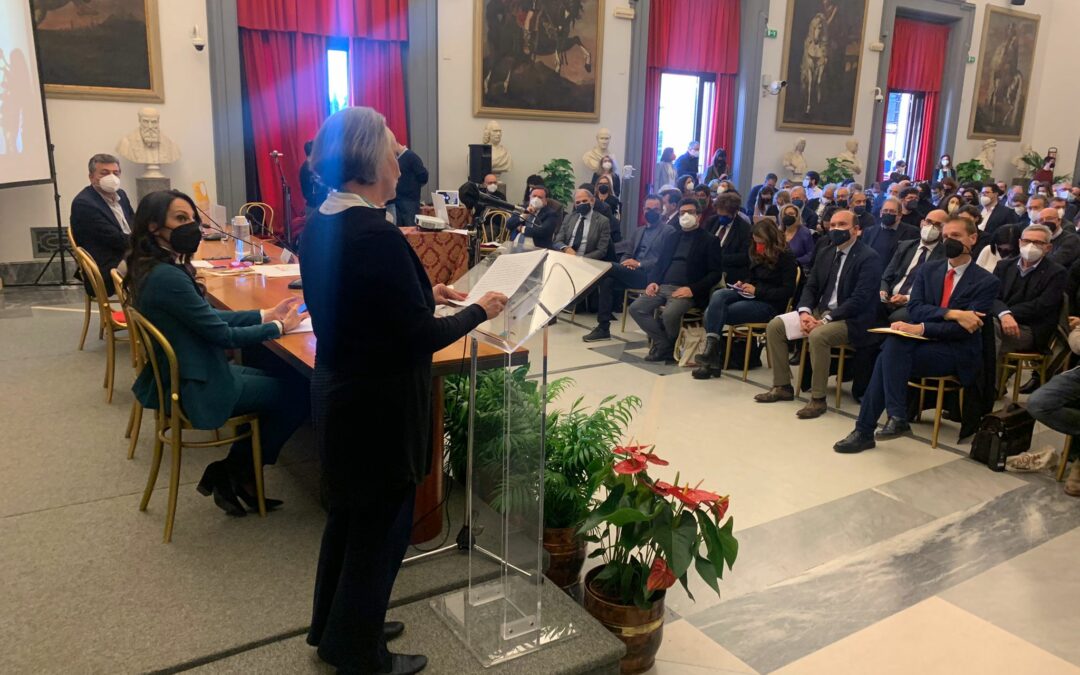Planets aligned…? Yes, the moment is propitious to exploit the added value of the union of all the different forces to truly implement the Rome Food Policy. Administration and citizens together: bottom-up-mode as is tradition in Rome; thanks to the very active civic associations and to FUSILLI’s mediation.
Busy winter weeks
The plenary assembly of the Roma Living Lab took place on 13th December, 2021 on the day of Saint Lucia. A “festival of light” that illuminated the good practices already active in the city, and also, after years of work, the commonality of intent with a new administration that has eventually identified food policy as a priority. The light at the end of the tunnel… and that wasn’t a train…! 😉
When FUSILLI participated in the conference for the revitalization of urban agriculture in the Castel di Guido farm, it was December 22nd: the same date of the Constitution of the Italian Republic’s approval in 1947. On the Epiphany day, FUSILLI and the Promoting Committee for the Food Policy were invited by the Councillor to what we remember here as “the coffee of the Befana“: that day in Rome is traditionally THE winter festivity, when the old Befana (witch) used to bring gifts to children long before Santa Claus showed up! By the way, so taken by the “peace table on the food policy” nobody grabbed us any coffee…
For once, in this huge, chaotic, magnificent but dispersive city, full of contrasts and still suffering from the effects of Covid, fingers crossed we are – finally – managing to work ALL TOGETHER, (almost) in agreement, even managing to create synergies with some of the many European projects active in the city on similar issues as FUSILLI. On February 2nd FUSILLI participated in a board meeting of EFUA project, in preparation of the international conference “FACTS!”, taking place on March 29-30 2022, when Rome will broadcast worldwide the results of the most innovative practices and researches, including the Oslo FUSILLI team who will give a speech about practice-governance models. February 2nd: Candlemas festivity, the saying goes “if Feb 2nd is a sunny day…winter is over!” So we hope. It is all too easy to continue the metaphor about the synergy with the Ru:rban Second Wave project on the transfer of good practices of urban gardens from Rome to (further) 4 European cities, formally launched on 4th of February, the day of the patron… of resilience. 😉
How Rome created the green wave
Since 2007, Rome has been a partner in European projects on circular economy, sustainability, urban and community agriculture: a real “green wave”. The city has learned, taught and built knowledge and, since 2012, is using its experience to improve its governance processes.
Urban agriculture is an uninterrupted tradition in Rome from the VIII century B.C. Today, it is the largest agricultural municipality in Europe, hosting thousands of farms, 150 community urban gardens on public land – with endless waiting lists of citizens who want to be part of it – and countless urban gardens on private land. Best practice city for the participatory model of bottom-up governance in 2017, Rome – as first city in Europe – has approved the resolution nr 38 Regulation on urban gardens in 2015. Thanks to its active citizenship, Rome was one of the founders of the MUFFP in 2015, and in 2021 approved the Resolution on food policy through the advocacy of associations, professionals, researchers. Resolution no. 38, again…
In the last 20 years, the number of food networks has increased significantly in terms of short supply chains, farmers’ markets, ethical purchasing groups, box scheme experiences: 33 farmers’ markets; 55 EPGs; 2,656 farms, 744 of which sell directly. This is our “fertilized soil”. Now we start the thematic working tables on the various priorities of the city’s food policy.
The great pool of different interests
What does Rome eat? How much? How many people don’t eat enough? How much food is wasted? How much reused? How healthy is it? How sustainable is it? Where is it produced, bought, delivered? Does the food supply chain give its employees a decent living? And therefore: which guidelines to choose for the transformation towards sustainability, which policies are needed? How to quickly activate them? Who governs the process? As many answers to these questions as the Roman rightsholders and stakeholders. So, the building of confident synergies will be Roma Living Lab’s task for the next 3 years. There is goodwill in citizens, experts and the administration, there are good skills, but the interests are socially, economically and politically really huge, numerous, varied, and often conflicting. This is a real big complex system, of which we are still understanding the rules.
We do not delude ourselves, it won’t be simple: the debate is heated, democracy is tiring, but we believe, with Heraclitus, that “From acting on conflicts, from not hiding the contrast between opposites, harmony is born”.
Credits for image: Courtesy of PNRR Office Roma Capitale and Risorse per Roma
